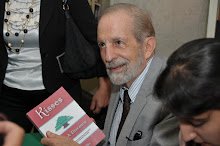Why Do People "Believe?"
Recent surveys show that some 47% of Americans believe the
biblical six-day account of creation. Additionally, some 70% believe in the
existence of a "higher power" (God).
Interestingly, the latest data also show that more than 20%
of the population is composed of atheists and agnostics. Many of these non-believers,
in defense of their science-based position, contend that "believers" are
either undereducated or incapable of critical thinking. Of course, this explanation
is woefully simplistic because there are many intelligent, well-educated people
who have a proud commitment to their "faith." This apparent divergence
leads one to wonder if there might be a scientifically plausible basis for this
condition.
Many of our implanted genetic inclinations have histories that
reach back to the earliest days of humanoid evolution. And some are quite
irrational. Primitive man's primary directive for survival led him to create
supporting corollaries that also appear in our DNA. Bad experiences, such as being
attacked at night by unseen predators, led to an inbred fear of darkness. Lack
of understanding of the laws governing our environment, especially weather phenomena,
led man to create deities for the sun, wind, rain, lightning, and other awesome
events. Over time, belief in these extra-terrestrials became imperatives that
were firmly impressed in our DNA.
The deities were sometimes benevolent (providing him a
bountiful catch), and at other times worked against him (leaving him hungry). All
too often the lords of his universe were angry and ways were sought to appease
them. He made offerings, gave a share of his bounty or items that were valuable
to him. In extreme circumstances he would even sacrifice his children. These supplications
were thought to sometimes work (although in a highly random fashion). Regular
rituals evolved with the erection of temples dedicated to the more powerful
deities. And over the span of two million years of existence, our DNA has continued
to be replenished and reinforced with the need to appease these
gods. The "faith" imperative of unseen gods has obviously followed
man wherever he went, as evidenced by its prominence in our contemporary genetic
makeup.
Since the Age of Reason descended upon humanity some 500
years ago, many previously unexplained phenomena have been shown to obey newly revealed
laws of science—be it physics, chemistry, biology, astronomy, anthropology or mathematics.
These advances have come into direct conflict with literally held biblical beliefs—especially
in the account of creation. Charles Darwin's theory of evolution crashed headlong
into the beliefs of biblical fundamentalists and many of them see him as their "anti-Christ."
Ironically, those who have inherited the strongest strain of
the "supreme being" DNA strand are those most dedicated to opposing Darwin's
theory. They steadfastedly reject the very explanation that could rationally explain
the illogic of their rigid beliefs. In defense of their convictions, they attack
any branch of science that might challenge their beliefs. This lack of
understanding, just as in their primitive ancestors, has caused them to create a
new "god," one of anti-science.
Evolutionary biologists have observed that even relatively
recent ancestral experience can influence our hereditary imperatives. With the
continued reinforcement of the "God" belief in a majority of the
population, it doesn't appear that the need to have at least one deity will
disappear any time soon.




